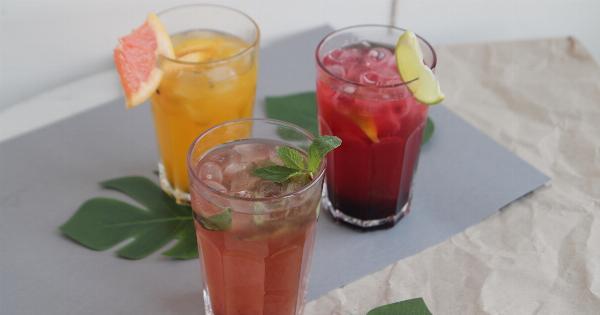A cold can easily make you feel miserable, but thankfully, there are a variety of beverages that can help you feel better faster. From hot tea to soothing broths, these top beverages are just what you need to kick your cold to the curb.
1. Ginger Tea
Ginger tea is loaded with antioxidants and anti-inflammatory compounds that can help ease sore throat, cough, and other cold symptoms.
This beverage also contains gingerol, a compound that is known for its antiviral and antibacterial properties which can help fight off the cold virus. Simply steep fresh ginger slices in hot water for a few minutes and sweeten with honey, if desired.
2. Hot Broth
Chicken soup is a timeless remedy for the common cold. It’s hydrating, easy-to-digest, and can help reduce inflammation in the body. If you’re a vegetarian or vegan, you can opt for a vegetable broth instead.
The heat from the broth will help to soothe a sore throat and the high nutrient content can also give your immune system a little boost.
3. Green Tea
Green tea is high in antioxidants, especially a type called catechins, which have been shown to have antiviral and antibacterial properties. Drinking green tea can also help to boost your immune system and reduce inflammation in the body.
You can add a teaspoon of honey to sweeten it up if needed.
4. Citrus Drinks
Citrus fruits like lemons and oranges are high in vitamin C, which can help reduce the length and severity of a cold. Sipping on a warm lemon water or orange juice can help soothe a sore throat and boost your immune system at the same time.
5. Hot Toddy
When you’re feeling run down from a cold, a hot toddy can provide much-needed comfort. This classic winter drink is made by combining hot water, honey, lemon juice, and a shot of whiskey or bourbon.
The heat from the drink can help ease congestion, while the alcohol can provide a mild pain relief effect.
6. Echinacea Tea
Echinacea is a natural remedy that’s often used for cold and flu. The herb has immune-boosting and anti-inflammatory properties that can help alleviate cold symptoms and promote healing.
You can find echinacea tea in most health food stores or online.
7. Apple Cider Vinegar Drink
Drinking apple cider vinegar can help balance the pH levels in your body and boost your immune system.
To make a soothing apple cider vinegar drink, mix one tablespoon of raw, unfiltered apple cider vinegar with a teaspoon of honey and a cup of hot water. The honey helps to improve the taste and also has antibacterial properties.
8. Turmeric Milk
Turmeric has anti-inflammatory and immune-boosting properties that can help ease cold symptoms. To make a warming turmeric milk, combine turmeric powder, honey, and milk in a saucepan and heat until the mixture is hot.
You can also add cinnamon powder which has antimicrobial properties.
9. Vegetable Juice
Drinking fresh vegetable juice is a great way to flood your body with nutrients when you’re sick.
Vegetables like kale, spinach, carrots, and bell peppers are packed with immune-boosting vitamins, minerals, and antioxidants that can help to speed up your recovery.
10. Warm Water
Believe it or not, simply drinking warm water can help to ease the symptoms of a cold. The warmth from the water can help to soothe a sore throat, while also hydrating your body.
If you find the taste of plain water boring, try adding a wedge of lemon or a slice of ginger.
Conclusion
There are many different beverages that can help alleviate the symptoms of a cold and speed up your recovery.
From ginger tea to vegetable juice, these drinks can help boost your immune system and provide much-needed comfort when you’re feeling under the weather.































